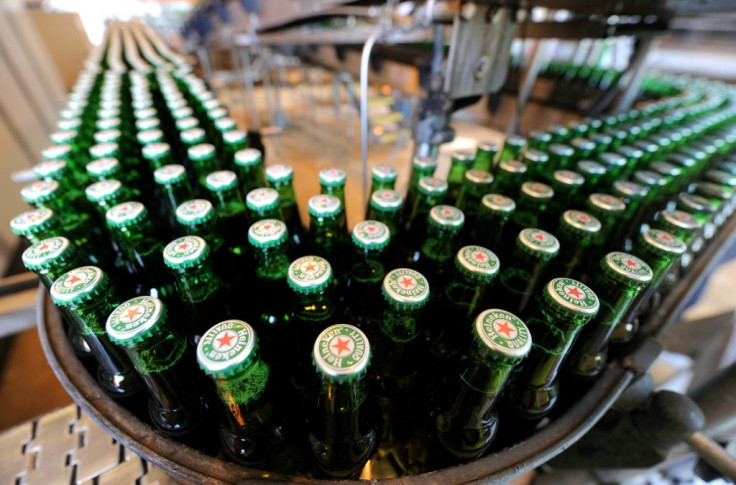Heineken To Cut 8,000 Jobs As Covid Takes Fizz Out Of Sales
Dutch brewing giant Heineken said on Wednesday it would cut around 8,000 jobs worldwide after the closure of bars and pubs during the coronavirus pandemic pushed it into the red.
Sales and profits at the world's second biggest brewer, which also owns the Tiger, Sol and Desperados brands, plummeted due to restrictions brought in by many countries to curb Covid-19.
Heineken chief executive Dolf van den Brink, who took charge last April, said it had been "a year of unprecedented disruption and transition" for the Amsterdam-based company.
The layoffs by the firm will slash nearly 10 percent of its global workforce of around 85,000 people, and will be spread between the Netherlands and other countries.
Heineken reported a net loss of 204 million euros ($247 million) for 2020, compared with a net profit of 2.1 billion euros a year earlier.
Beer sales fell by 8.1 percent with the brewer's overall sales dropping 17 percent to 23 billion euros.
"The Covid-19 pandemic and governments' measures continue to have a material impact on our markets and business," Heineken said in a statement.
Heineken sales were down 1.62 percent at 1230 GMT in trading on the Amsterdam stock exchange.
Closures of pubs, bars and restaurants in many countries during the coronavirus crisis and restrictions on alcohol sales have severely impacted the hospitality industry around the world.
Heineken, the world's number two brewer behind Belgian-Brazilian AB InBev, was particularly hit by its heavy presence in drinking-holes around the globe, its CEO admitted.
Areas where the grip of the virus is strongest were among the worst hit. Beer sales in bars were down 40 percent in Europe and decreased significantly in Mexico, while South Africa was badly hit by a ban on all alcohol sales.
Less than 30 percent of outlets were operating in Europe, in particular at the end of January, it said.
"The impact of the pandemic on our business was amplified by our on-trade (bars, cafes and restaurants) and geographic exposure," said the Dutchman.

The core Heineken brand was a "bright star", van den Brink said, only dropping 0.4 percent and "significantly outperforming the total market".
It grew double-digits in 25 markets including Brazil, China and Britain, it added.
The zero-alcohol Heineken 0.0 was another rare success, with single digit growth globally.
But other brands had a "mixed performance" with growth for Desperados tequila-flavoured beer and a slight rise for Birra Moretti, but Amstel and Sol sales were down.
Heineken said sales and profit would likely stay below the levels of 2019 despite the rollout of vaccines, although it expected "conditions to gradually improve" in the second half of 2021.
Heineken had announced in October that restructuring was needed to reduce personnel costs but gave no figure for layoffs at the time.
CEO Van den Brink said on Wednesday that the brewer's restructuring plan was aimed at making two billion euros in savings by 2023.
The layoffs were designed to save around 350 million euros, it said.
"The overall restructuring programme will reduce our employee base by (about) 8,000 people," Wednesday's statement said.
This includes cutting jobs at the head office in Amsterdam while other layoffs would depend on local circumstances, it added.
Heineken's reshaping plan includes a focus on its iconic green-bottled namesake brand, plus "fewer, bigger bets in local premium brands", it said
The brewer, founded in the 19th century in Amsterdam, now sells more than 300 brands worldwide.
The company said it would also focus on no-alcohol options and push into "hard seltzers" -- alcoholic soft drinks.
© Copyright AFP 2024. All rights reserved.




















